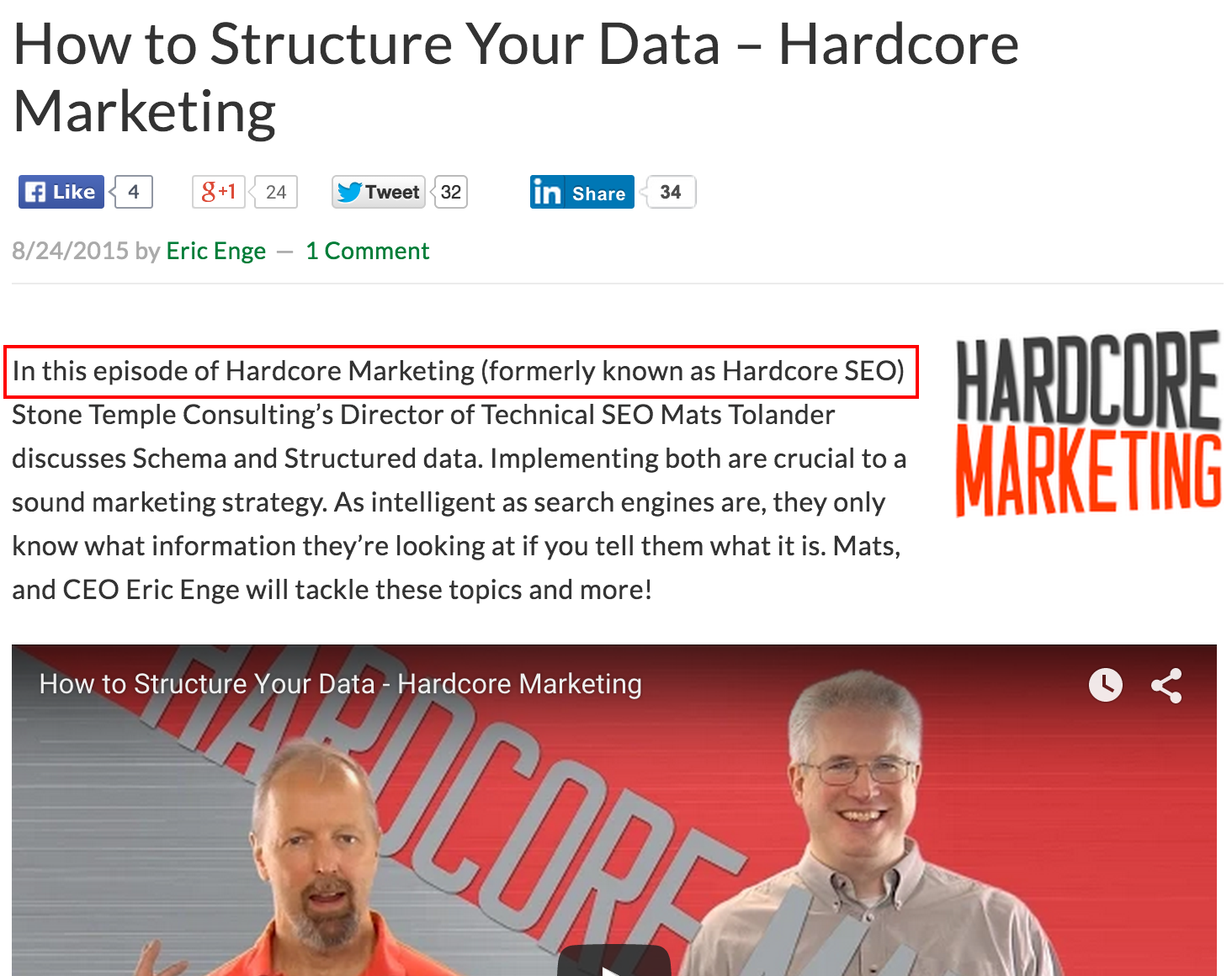My first “SEO job” consisted of pumping out keyword-stuffed blog posts and then posting them on a website that would link to a company’s website while attempting to hide from Google that both sites were owned by that company.
In my second “SEO job,” I would submit the company’s website to countless random directories and push people to add a backlink-stuffed widget to their websites’ sidebars. In my third “SEO job,” my bosses wanted me to build as many links as possible, no matter how and no matter where.
Years later, when I was either consulting or working at agencies, my “SEO clients” obsessed over Google rankings:
– “Let’s talk about the marketing messages in your website text.”
– “Will that increase my rank in Google?”
– “We need to work on your landing page’s conversion rate.”
– “Will that increase my rank in Google?”
– “We should create different marketing collateral for the website for people in different stages of the marketing funnel.”
– “Will that increase my rank in Google?”
I have stopped saying that I do “SEO” specifically because of people obsessing over rankings — something that is only one part (and a small one at that) of marketing strategy. And as I noted in an earlier essay on the death of linkbuilding, it seems that I’m not the only one. In the past couple of years, SEOMoz became Moz, ThunderSEO became ThunderActive, and seOverflow became Inflow.
Moreover, I recently saw this post from Stone Temple Consulting (see the highlighted bit):
Why did these companies rebrand themselves to move away from SEO directly and specifically?
Stone Temple Consulting CEO Eric Enge told me this in an e-mail interview:
We used to call one of our video shows Hardcore SEO, but we recently changed it to Hardcore Marketing. The reason why is simple, and has two parts to it:
- For several years our services have been quite a bit broader than just SEO, including things such as content marketing and social media services.
- Our move to broaden our service profile was in anticipation of major market changes in SEO, namely the need for it to be fully integrated into the broader marketing and development efforts.
In short, it’s harder than ever to think about SEO as a standalone discipline, and now we need to view it as part of the bigger overall marketing picture.”
Inflow CEO Mike Belasco told me this in an e-mail interview:
seOverflow was our brand as an SEO outsourcing company. Our primary business model was providing SEO assistance to in-house teams and other agencies that lacked the technical expertise necessary for the type of auditing and analysis we did.
We were already working with more clients directly, and wanted to continue in that direction, so we expanded our services beyond SEO and into Inbound Marketing, CRO, PPC… Eventually the “seOverflow” brand name became a limiting factor.
Inflow still does quite a bit of SEO. Organic search is a channel with huge potential for most of our clients. The only difference now is that our omni-channel approach to eCommerce marketing allows Inflow to develop and implement comprehensive digital marketing campaigns for their brands.
ThunderActive CEO Max Thomas told me this in an e-mail interview:
Strategically, we rebranded from ThunderSEO to ThunderActive because the company’s services expanded to include search, social, content, sem, strategy, design and email. We grew into a full service interactive marketing agency, versus only SEO. In terms of industry, we watched SEO shift from being the lead driver of inbound marketing to an integral part (but not necessarily always the lead) of the entire interactive mix. The rebranding seemed like a natural next step.
Moz cofounder Rand Fishkin referred me to this Moz post in which he described the company’s decision. I encourage readers to look at his post in full, but I will summarize his major reasons:
- “Calling ourselves ‘SEO’moz is no longer transparent and authentic”
- “SEO is bigger than just SEO”
- “For many folks outside of our community, the acronym SEO has (unfair) associations with spam or manipulation”
- “For the sake of transparency, I need to be honest that this is also marketing move – a rebrand is a chance to earn a second look from people who’ve long known us and had associations with the company”
Still, there’s something more going on within the larger digital marketing industry, and I think people are only now beginning to realize it. Here’s one dirty little secret: Who determines brand perceptions? Not marketing or communications departments — in the end, it’s the customers and the public in general themselves.
Your restaurant’s decor, advertising, and employee uniforms might all aim to instill a certain feeling in me about your brand. But if I bite into your steak and it tastes like rubber, that’s what I’m going to think about you. And when I tell my friends and family about the experience, they will prioritize my communication over any other marketing messages that you send to them.
This problem has always faced the SEO industry. Many people think SEOs are either ineffective at best or a bunch of scammers at worst. Just see this article by Catalyst Search Marketing on how “SEO” has been portrayed in the New York Times, Dilbert, “The Good Wife,” and elsewhere. Ask any business owner who still gets countless spam e-mails from “SEOs” who promise to build them countless links to get them to rank highly in Google quickly.
Public perceptions of brands are extremely difficult to change once they have solidified. McDonalds sales have consistently been declining because of widespread public feeling — fair or not — that the food is now expensive, unhealthy crap. George W. Bush will likely always be known — fairly or not — for one of the largest, most-expensive, and bloodiest mistakes in U.S. history (the second Iraq War). American actor Charlie Sheen will now always be viewed as, well, you know.
When I left my journalism career and started my digital marketing career, “SEO” people obsessed about keywords and links. “SEO” was a bag of tricks to rank highly in Google. Before I started my job as Director of Marcom for log analytics software company Logz.io earlier this year, I once walked into the office of a CMO at a high-tech company to explore a consulting opportunity in the context of the overall marketing department. “What will the SEO person do?” I asked him. As I recalled in a Moz essay of mine on the structure of future marketing departments, the CMO replied, “Buy links.” It was about doing whatever it takes directly to rank first in Google.
That is what the brand of “SEO” will always be. Short of any large-scale PR campaign by SEMPO — and it’s doubtful that such a thing would ever occur — this perception will never, ever go away. It saddens me, but it’s the truth. In the end, SEOs don’t define “SEO” — it’s the public at large.
As Google became smarter and smarter over the years — chiefly through the content-based Panda and link-based Penguin algorithm updates — the old tricks thankfully started to die, one by one. So, SEOs were forced to change:
- They started proclaiming that “content is king”
- They started talking about “earning links” rather than building them
- They started talking doing “outreach” and “content marketing” to earn links
Over the past several years, SEOs have moved from talking almost exclusively about keywords and links to discussing page-load time, website content, mobile-responsive design, public relations, conversion-rate optimization, and more. As Google’s algorithm starts to think more and more like a human being, all of these things are directly and indirectly affecting search-engine rankings because they are involved in building brands among human beings that deserve to rank highly.
However, the more work that “SEO” encompasses, the more that the phrase itself becomes meaningless. If a word means everything, it means nothing. Except for technical and on-page issues, “SEO results” now come from merely doing good web development, marketing, and PR — and the latter two are simply called by various other names by digital marketers. Links, for example, are just by-products of doing those two things well.
“SEO” has become and will always remain a tainted phrase. “SEO work” now necessitates work in many other marketing functions in a way that has led to people including Fang Digital Marketing CEO Jeff Ferguson and myself now describing “SEO” as “a collection of best practices.” (Note: Ferguson gets the credit for the first use of that phrase that I know.)
If “SEO” is just a “collection of best practices,” then it’s just another word for “marketing.” (Though I personally use “SEO” for technical website practices and “marketing and PR” for everything else.) For those reasons, we will see more and more mentions of “marketing” and fewer and fewer mentions of “SEO.” And I like that.




